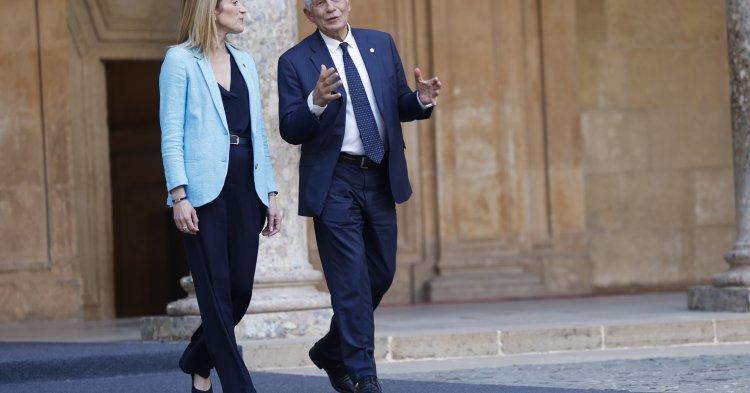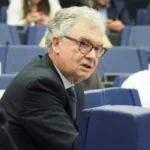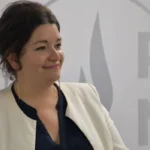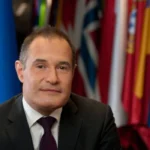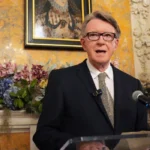Following the European elections in June 2024, a new Commission will be formed. The High Representative of the Union for Foreign Affairs and Security Policy, Josep Borrell, has thus entered the last phase of his mandate. This outsider of international relations, who led an unprecedented deployment of the Union’s hard power, a decisive transformation of the European Peace Facility, as well as a decisive rise in European defense policy, is facing his latest challenges . The High Representative will notably have to consolidate the parameters of a speed of institutional and diplomatic transformation, which was initiated in 2022 with the outbreak of the war in Ukraine.
On Monday October 2, 2023, the foreign ministers of the European Union met in kyiv, during an informal meeting, under the presidency of Josep Borrell. A particularly emblematic diplomatic sequence which placed the intergovernmental process and the High Representative in a movement of ascension on the international scene.
Josep Borrell reaffirmed the coherence and resilience of his policy, in the context of the war in Ukraine. At a press conference at the end of the meeting, he recalled:
“This is the first time that the Council has met outside the European Union. This is the first time we are meeting in a candidate country. And unfortunately, it was also the first time that the foreign ministers of the European Union met in a country at war. Of course, we would have preferred to meet under other circumstances, but these circumstances are as they are and we must help Ukraine meet this challenge. Coming to kyiv, the foreign ministers of the European Union sent a strong message of solidarity and support to Ukraine in the face of this unjust and illegitimate war. »
The rise of an international relations outsider
From 2019 to 2023, as an outsider in international relations, Josep Borrell finally imposed the authority of his function, by skilfully positioning himself in the arrangements of European institutions. The High Representative was able to combine his action with the initiatives of the European Commission led by Ursula von der Leyen and the resolutions of the European Council chaired by Charles Michel.
Both Vice-President of the European Commission and High Representative, President of the Union’s Foreign Affairs Council, actor in a sophisticated supra-state process, Josep Borrell managed to structure the framework for efficient action.
In March 2022, Josep Borrell referred to his predecessor Javier Solana and identified a speed of mutation that he applied to the dimension of power:
“As my friend and first High Representative of the Union Javier Solana says, time in politics, as in physics, is relative: if the speed at which you change is lower than the speed of change around you, you go backwards. And we cannot afford that. »
The power of the High Representative is essentially based on his role as arbiter, negotiator, architect of consensus and creator of new power mechanisms. Josep Borrell fully exploited the resources of his power and optimized his capabilities, during the war in Ukraine, by docking with speed and acceleration. He now asserts himself, at the same level as Ursula von der Leyen and Charles Michel, in a precise and skillfully constructed configuration.
Support of 5.6 billion euros for the Ukrainian armed forces
Under the authority of Josep Borrell, High Representative of the Union for Foreign Affairs and Security Policy, the rise of the European Peace Facility (EFF) proved dazzling and decisive, during the war in Ukraine . Seven tranches of 500 million euros in support of kyiv have been confirmed by the Council of the European Union. As of February 2, 2023, the total EU contribution under the EFF to Ukraine amounted to €3.6 billion.
On April 13, 2023, the Council validated a 1 billion euro ammunition assistance measure. On May 5, 2023, the EU Council approved a second assistance measure worth €1 billion, bringing the total EU contribution to maintain delivery to €5.6 billion. of military equipment to Ukraine, through the FEP.
The financial ceiling of the FEP, established by the Council of the EU on March 22, 2021, stood at 5.5 billion euros (in current prices), for the period 2021-2027. This limitation of the FEP’s capacities was no longer bearable, while assistance to Ukraine continued to grow. In continuation of the political agreement of December 12, 2022, the Council established on March 14, 2023, the ceiling at nearly 8 billion euros until 2027. Following the agreement of March 20, 2023, the Council brought the overall financial ceiling to more than 12 billion euros on June 26, 2023.
An eighth tranche of 500 million, under the FEP, in an impasse
On May 22, 2023, before the Foreign Affairs Council was held on the same day, the Hungarian Minister of Foreign Affairs, Péter Szijjártó, initiated a balance of power and announced that Hungary would not accept the adoption of an eighth tranche of 500 million euros in support to Ukraine, under the EFF, as long as Ukraine does not remove OTP Bank, Hungary’s leading banking establishment, from the list of international sponsors of the war.
The deployment of the FEP in Ukraine was thus paralyzed and the Foreign Affairs Council was unable to reach a compromise. At a press conference following the Council, Josep Borrell encouraged Member States to achieve the adoption of an eighth tranche of support for Ukraine, under the EPF:
“I stressed that every day of delay in our deliveries must be measured in human lives. It’s not a question of money. These are people killed, soldiers killed or injured. I urge all ministers to speed up delivery and participate in the joint purchase of munitions for Ukraine and to finalize work for the next tranche of the European Peace Facility. »
Hungary focused its political pressure operation on the FEP, without extending it to other European Union systems, in the context of the war in Ukraine. On June 23, 2023, Josep Borrell could lead to the adoption by the Council of an eleventh set of economic and individual sanctions against Russia. During the informal meeting of European Union foreign ministers, in Kiev, on Monday October 2, 2023, in the absence of Péter Szijjártó who was represented, the FEP was kept in an impasse, despite the temporary suspension of OTP Bank by the Ukrainian National Agency for the Prevention of Corruption (NACP), from its list of international sponsors of the war.
Hungary’s reservations about the action of the European Union during the war in Ukraine had been established since the start of the conflict, and notably concerned the initiation of sanctions packages. This reality was overcome by Josep Borrell, who was able to generally maintain an efficient process, a constant speed of progress and solid cohesion of the Member States.
20 billion euros for Ukraine, the next four years
On July 20, 2023, at the end of the Foreign Affairs Council, Josep Borrell announced the opening of discussions on the creation of a specific section, within the European Peace Facility, in order to mobilize up to 5 billion euros per year, for the next four years, or 20 billion euros in total, with the aim of ensuring a long-term security commitment to Ukraine. On October 2, 2023, Josep Borrell returned to this project and expressed the desire for a political compromise again this year, “when the Member States must agree on the revision of the multiannual financial framework. »
During his speech to the Union’s foreign ministers, the Ukrainian President, Volodymyr Zelensky, welcomed the political will of the High Representative to commit 20 billion euros over four years and called on the Member States to “unblock and the disbursement of the eighth tranche of aid amounting to €500 million under the European Peace Facility. »
Include the speed of transformation in resilience
Tensions with Hungary over the deployment of the FEP in Ukraine, victory of the pro-Russian Robert Fico in the legislative elections in Slovakia, diplomatic crisis between Poland and Ukraine over cereal exports: the cohesion of the Member States is disturbed by the affirmation of national interests and divergent doctrines. The United States faces similar political movements within Congress, where Republicans particularly support a more reserved foreign policy.
The turning point of the Borrell era had begun with the outbreak of the war in Ukraine, the challenge now for the High Representative is to place his action and his results, his speed of transformation, in resilience and to avoid a deceleration. Josep Borrell must be able to perpetuate the authority of his function, to forge the foundations of the action of his succession and to define the prospects of a supra-state power in creation.
This article is originally published on .taurillon.org

